MARCH 15-22, 2003
JEWDAY
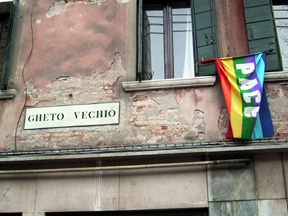

On Monday morning, we were surprised by how nice a breakfast was served in the dining room--fresh and canned fruit, fresh juice, cereal, breakfast hams and cheese for the Germans (surprisingly few), good croissants, and a good espresso/capuccino machine. Some days, there were hard-boiled eggs. You could have a big breakfast and make yourself a couple of croissant sandwiches, take some fresh fruit, and you've got a picnic lunch.
We went by vaporetto to the Ghetto. At one time, Venice was the most powerful empire in the world. The Turks and the Austrians controlled it for a time, but the Venetians were always good to the Jews--good, in that they were a trading state, and the Doge understood that the Jews were good businessmen (plus they owned the media and the banks and were good doctors), so they allowed them to live in the Ghetto. The origin of the term is debatable. Some say, the original area was the site of foundries, called in old Italian (Geto, with a soft g). Others think it is from Get (Hebrew for divorce), while still others say it is from the German "gitter"--a grating of iron bars. Still, when the republic was taken back from the Turks, there were celebrations marked by three parades, where each group was made to march through the streets--the whores, the asses, and the Jews. The Revolution of 1848 was led by Daniele Manin, a Venetian Jew. The Jews enjoyed their freedom and assimilated. In 1931, there were 1814 Jews in Venice. The Nazis deported 205, including the Chief Rabbi. Many Jews were hidden by righteous Venetians. Today, there are only 400 Jews.
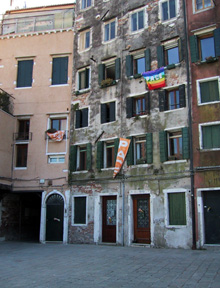 ..
..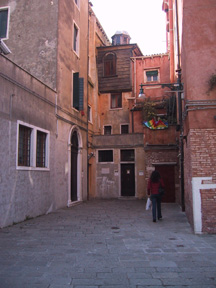
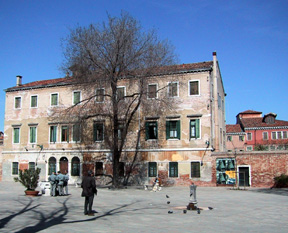 ..
..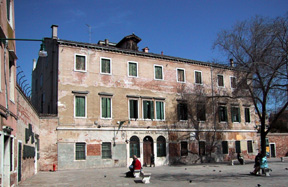
We toured the Jewish Museum and synagogues with a knowledgable guide. There are 5 synagogues in the Ghetto, but the community is so small that they decided to close 3 of them, leaving one for the summer months and one for the winter months. The synagogues are tiny, with none of the grandeur of their counterpart in Florence.
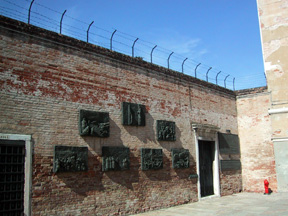
Of course, the Lubavitch have a presence, and despite the prohibition, "Do not separate yourself from the community," they have done just that, and have nothing to do with the community-at-large, for which they are resented. Besides, "They are not from here."
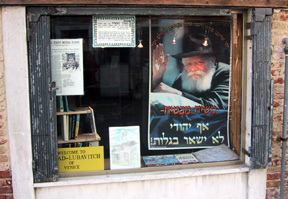
We stayed in Canareggio, the neighborhood where the Ghetto is located and had lunch--excellent pizza, and cheap wine at Vesuvio. The highlight of lunch, however, was spaghetti al polpitto--spaghetti in a bowl coated with black squid ink, that had a very briny and strong tasete and smell. It does leave your face and the outline of your gums coated in black, so everyone knows what you had for lunch. Some restaurants call it Spaghetti Otello (black and white...get it?).
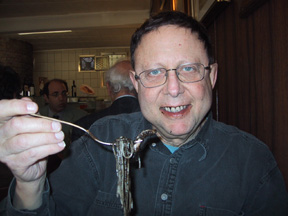 ..
..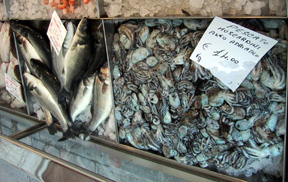
I sat in a café and read, while Carol went exploring on her own, seeking out the Big Jews. Indeed, she found the Chief Rabbi (the only rabbi), and they spoke for a while in Hebrew. Everyone is Orthodox by denomination, but not in observance.
It was Purim this evening, and we joined the services in the Levantine synagogue, the most beautiful of all. If there are 400 Jews in Venice, then half of them were there, and the men, at least, were quite knowledgable. There were no page announcements. The chants were Sephardic in tone, even though most are Ashkenazim. The rabbi spoke at length about Purim. I thought about how the story of Purim was echoed in our time by a threat to exterminate all the Jews from an evil man and his followers. But the outcome here was different. The Jews were not all saved. The rabbi pointed out that Haman is not simply an evil for the Jews. Haman is from the nation of Amalek, which attacked the Jews in the wilderness when they were living high off the hog, pleased with their freedom and the promise of a land. But the Jews were straying, and evil men like Haman unify the Jews and strengthen their resolve. So it was, by implication, with Hitler. The rabbi was kindly, an intellectual, but the thought seemed a bit primitive to me in terms of justifying the Holocaust as a good thing for the Jews. The women sit upstairs, can't see a thing, and talk through the service. The men all participate and don't talk. There are no noisemakers, they just stamp their feet briefly. Afterwards, there was no celebration; people just milled in the street and went home.
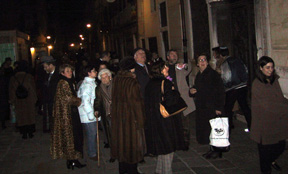
We had dinner at a small place with the menu in four languages outside. Avoid such places, for they cater to tourists. On the other hand, almost every restaurant has such menus outside. Carol had orata, a local fish, and I had spaghetti with baby clams. It didn't hold a candle to Guido's in Providence. They don't use much garlic when they cook here, and I think they leave that to the low-class southern Italians (and me).